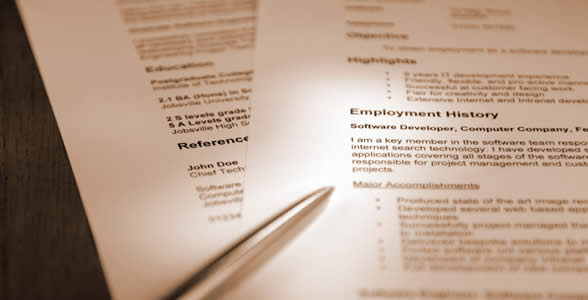
Unfortunately, we only have one chance to make a first impression and a mistake on your resume can stand in the way of you and your dream job. A resume is an important sales tool that outlines your work history, sells your achievements and highlights your accomplishments to a potential employer. Here are 10 common resume bloopers that people make and how to avoid making them.
Keep it simple stupid
Use a simple font and a maximum of two fonts. The focus is on content and substance over style. Employers are going to scan your resume quickly so make it as easy for them as possible. Good use of white space, clear and consistent section headings and use of bullets all help to make important items stand out.
Email addresses
sexyfox99@serviceprovider.com might be a perfect email address to apply for a role in an adult film. However, if you’re applying for a corporate role, it reeks of unprofessionalism and nothing will make an employer press the delete button faster than an inappropriate email address. Create a free email account specifically for job hunting that is a derivative of your name such as firstname.lastname.@serviceprovider.com.
Typos
Ask a trusted friend to proof check your resume to avoid unfortunate errors such as ‘I work in pubic relations’ or ‘I was hired to check on the company’s asses’. One typo can mean the difference between being asked for an interview or your resume put in the ‘no’ pile.
Size counts
Say all the things you need to say but keep an eye on the page length. Ideally, a good length is three pages or less.
The one size fits all resume
Make sure you customise your resume for each job. If you have a career objective that states you want to work as a web designer when you’re applying for a customer service role, your resume will be in the bin faster than you can say ‘Do you want fries with that?’ Keep in mind that your resume is a sales tool and you need to change the tasks listed in your resume accordance to the job you are applying for.
Focus on responsibilities instead of results
Don’t just tell employers what you do, tell them how well you do it. List a few of your most significant achievements, accomplishments, and successfully completed projects. Where possible quantify your responsibilities with figures to back it up eg I increased sales by X% or website traffic grew by xxx amount.
Hiding behind your vocabulary
While it is important that your resume blows your own horn, be careful that you haven’t over exaggerated your position and duties. Simple language is better and easy to read and it is also important not to use jargon or acronyms. While these terms may be widely known in your industry, your resume may be read by a human relations consultant or recruiter who may not be as familiar with these terms.
Honesty is the best policy
Admittedly, most of us ‘embellish’ our resume and ‘exaggerate’ our strengths but outright lying in a resume about a position that you held, a company that you worked for or your education is a huge no no and you will be found out sooner or later. Honesty is always the best policy.
Providing poor references
Providing referee’s names who will are not likely to provide a good assessment of your skills and give you a good recommendation is basically shooting yourself in the foot and putting yourself in the ‘don’t call us, we’ll call you’ category. If you cannot list your current or previous supervisor, use a reference from another supervisor at the company, references from clients, a reference from volunteer work you may have done or a personal reference.
Contact information is incorrect
Make sure contact details are correct and up to date. This seems so simple and yet this is one of the most common mistakes on resumes. Make sure you also leave a mobile number and have voicemail so recruiters can catch you on the go.
A resume is the first point of contact between you and the employer. Avoid making these common resume mistakes to ensure it won’t be your last.
